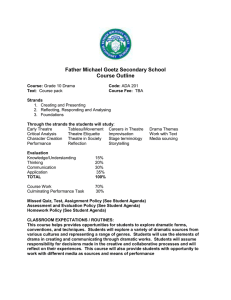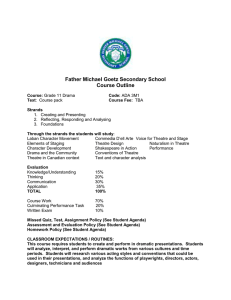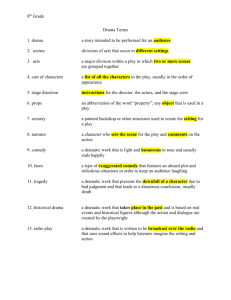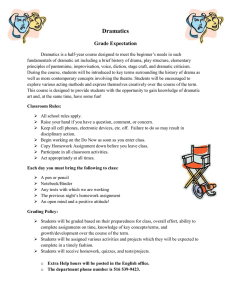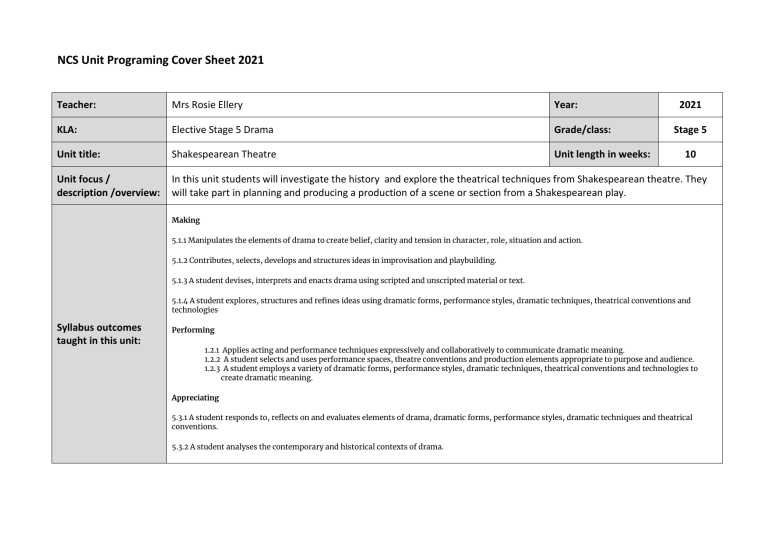
NCS Unit Programing Cover Sheet 2021 Teacher: Mrs Rosie Ellery Year: 2021 KLA: Elective Stage 5 Drama Grade/class: Unit title: Shakespearean Theatre Unit length in weeks: Unit focus / description /overview: In this unit students will investigate the history and explore the theatrical techniques from Shakespearean theatre. They will take part in planning and producing a production of a scene or section from a Shakespearean play. Stage 5 10 Making 5.1.1 Manipulates the elements of drama to create belief, clarity and tension in character, role, situation and action. 5.1.2 Contributes, selects, develops and structures ideas in improvisation and playbuilding. 5.1.3 A student devises, interprets and enacts drama using scripted and unscripted material or text. 5.1.4 A student explores, structures and refines ideas using dramatic forms, performance styles, dramatic techniques, theatrical conventions and technologies Syllabus outcomes taught in this unit: Performing 1.2.1 Applies acting and performance techniques expressively and collaboratively to communicate dramatic meaning. 1.2.2 A student selects and uses performance spaces, theatre conventions and production elements appropriate to purpose and audience. 1.2.3 A student employs a variety of dramatic forms, performance styles, dramatic techniques, theatrical conventions and technologies to create dramatic meaning. Appreciating 5.3.1 A student responds to, reflects on and evaluates elements of drama, dramatic forms, performance styles, dramatic techniques and theatrical conventions. 5.3.2 A student analyses the contemporary and historical contexts of drama. 5.3.3 A student analyses and evaluates the contribution of individuals and groups to processes and performances in drama using relevant drama concepts and terminology. Formal assessment (for Stage 5 RoSA and Year 11 & 12 only) : Group devised performance task – Students will build their own plays based on a choice of two themes set by teacher eg bullying or loss . Assessment summary for this unit: Informal assessment (all classes): Assessment for learning Progress performances for peers and teacher, self-reflection paragraphs, Assessment of learning Self-reflection paragraphs, book work Assessment as learning progress performances for peers and teachers Biblical perspectives Main Idea Students can work together to create meaningful communication. The ideas that we can communicate can have a powerful impact on an audience. Threads: Building Community Shaping Culture Playfulness and creativity Drama is an artform that explores and reflects human experience. It does this in content and in form or process. In exploring the history of theatre and the part it plays in the era in which it sets and the impact it has on our modern society, students can gain perspective about their own ways of thinking and living. It is hoped that as they see human history and experience more clearly they will be challenged by the bigger questions in life and strive to find answers for them. Shakespeare has had significant impact on our language and culture, just as the Bible had enormous impact on Shakespearean time and works. The way in which God’s story weaves through human history is an exciting thread to follow. Hazard identification & risk assessment of practical activities in this unit Likelihood of a risk becoming reality must be rated as: Very Likely, Likely, Unlikely or Very Unlikely The impact of a risk must be rated as: Extreme, Major, Moderate or Minor Practical Activities: Group work Creating props and sets Using makeup Risk tripping, bumping, falling Likelihood Impact Management strategies Low Low to medium Provide open spaces for each group to comfortably work in. Guidelines about use of levels and props tripping, dropping medium low to medium Supervision and teacher involvement in planning of items. Allergies Low low Enquire about students’ sensitivities and allergies Differentiation Drama is a subject that is differential by nature. Students enter a task at their own level and are given opportunity to try and practice new skills and exit at a more advanced level. This is because most tasks are open-ended and creative in nature. Support: A lot of the information delivery for this unit is in a video form. Students that take longer to process the information have the opportunity to review the videos on SETQA. Any note taking will be supported by scaffolding questions or subheadings. Where possible a visual plan for the lesson will be provided. As the unit advances from information gathering and applying to the higher level analysis and evaluation or application the students will be grouped so that there is peer support and learning happening. Extension/ enrichment: More capable students may be given the task of articulating why the group made the dramatic choices that they did. More capable students will be encouraged to take leading roles in driving performances and supporting other students in their group. AVID Strategies W guided note taking, mentor texts I C socratic seminar, world cafe O R super 6 strategy reading groups Student Learn To: 5.1.1 LS1.1 ● explore role and character through script, dramatic forms, performance styles and playbuilding ● develop roles/characters with commitment ● develop and use language appropriate to a role/character Additional ● manipulate elements of drama in a variety of dramatic forms and styles ● evaluate and refine the effectiveness of their role/characterisation through experimentation in rehearsal. Students Learn About: ● the processes of developing and sustaining a role/character through voice, stance, gesture and status ● the function of characters/roles in different forms of drama ● the role of the individual in the collaborative process of drama ● the use of drama terminology to express ideas Additional ● the use of stagecraft and rehearsal skills appropriate to process work. ● ● ● ● 5.1.3 Additional ● recognise and apply the conventions of script or text when making drama ● devise and enact scripts or texts of different dramatic forms or performance styles ● analyse, interpret and explore simple or multi-layered scripts and texts ● explore the social relationships between text, performance and audience. ● research and apply the conventions and techniques of chosen forms or styles the conventions applicable to various dramatic forms and performance styles ● use different dramatic theatrical techniques and conventions to vary dramatic presentations ● 5.1.4 ● 5.2.1 LS2.1 explore and/or devise and enact scripts and texts in different dramatic forms or performance styles, written by themselves or others explore character and character relationships in drama works and develop a sustained character and/or role select and use appropriate information and communication technologies in the process of devising collaborative dramatic works identify and respond to the use of stage space and stage geography within their script and text work move through and act with confidence in a designated performance space ● develop timing in performance ● create a basic actor/audience relationship in a variety of performance situations. ● ● ● ● ● ● ● the conventions and techniques associated with writing or enacting scripts or texts the inter-relationship of features such as form, style, theme, purpose and intended audience in drama scripts or texts computer-based technologies including the use of wordprocessing software programs to devise scripts or texts a variety of approaches to explore scripts or texts the use of improvisation and stagecraft in shaping and interpreting initial script/text work the transformation of the words of a text into a dynamic and active experience the use of appropriate language and literacy in script and text making. Additional ● the effect of believable interaction on stage and the difference between a fully developed character and a role ● identifying the use of symbols and metaphors in theatrical texts and creating them in their own works ● identifying the use of visual elements such as staging, properties, costumes and lighting in drama ● identifying the appropriateness of chosen texts, styles and performance spaces for an audience ● ● the conventions applicable to various dramatic forms and performance styles the presentation of ideas in stimulating ways to provoke audience thought ● performing with confidence in a variety of spaces and developing trust and collaboration with others ● the contribution of timing to the creation of impact and dramatic tension in dramatic works ● ● ● ● ● ● 5.2.2 5.3.1 LS3.1 improvise and explore some of the collaborative roles of the production team in a drama, theatre production or workplace explore the variety of performance spaces through managing and manipulating imagined or created spaces design/alter the performance space to suit particular playbuilding, dramatic form or performance-style needs appreciate that performance spaces and production elements must take into account their potential audience understand and use some production elements creatively in a performance situation explore and use theatre conventions and production elements which affect the actor audience relationship Additional ● understand and manipulate elements of stagecraft and production, using them perceptively and creatively in a performance situation ● explore and perform in a variety of performance spaces ● explore the nature of different theatre companies and their dramatic function in relationship to an audience ● use theatre conventions and production elements suitable for different purposes and audiences. ● recognise and discuss elements of drama in a variety of drama activities for dramatic meaning ● describe and respond to the conventions, dramatic techniques and technologies used in different performances. ● respond appropriately to their work and the dramatic work of others ● exhibit appropriate audience behaviour when watching various dramatic forms or performance styles ● describe and respond to the conventions, dramatic techniques and technologies used in different performances Additional ● various roles in the theatre (eg actor, stagehand, technician, director, designer, dramaturge, audience member) and their input into the theatrical experience ● the visual impact of design in a space, using elements such as shape, colour or composition to enhance a performance ● identifying performance spaces, eg arena, amphitheatre, thrust, closed and open stages/spaces, for various dramatic forms and styles ● the relationship between performers and audience according to the type of production and the chosen theatre space, eg hospital, nursing home, primary school, arena spectacular or street theatre ● the impact of production elements on the theatrical experience, eg costume, set, sound, front of house, stage management, publicity and technologies ● a range of theatre conventions and production elements from differing dramatic forms and contexts, eg the use of a chorus, mask or music Additional ● the impact of stagecraft and production elements on the theatrical experience, eg costumes, makeup, sets, sound, front of house, back stage, or publicity ● the conventions associated with spaces such as classrooms, blackbox theatres, thrust stages, theatres-in-the-round, outdoor venues, empty spaces or a proscenium arch ● ● the identification and importance of the elements of drama that together create dramatic meaning and audience engagement ● conventions, techniques and technologies applicable to various forms and styles ● recording their ideas in a drama workbook or in other forms such as oral/aural, visual representation, discursive, written or wordprocessed forms ● conventions associated with experiencing a live performance in comparison to cinematic and small screen viewings Additional ● identify specific social, cultural, gender, aesthetic and political issues in dramatic forms and performance styles ● the ways dramatic forms have reflected or facilitated change in various societies ● ● experience and appreciate dramatic and theatrical performances investigate the issues and themes present in a range of scripts, texts and performances inquire into the nature of various contemporary and historical dramatic forms and performance styles respond to and express ideas about drama in a variety of oral, written, active or computer based formats ● the ways in which writers and practitioners present social and cultural issues through drama texts and performances the ways in which people have used drama since the beginning of time to represent their ideas ● ● 5.3.2 Additional ● experience and appreciate a range of dramatic and theatrical performances ● deconstruct and analyse contemporary and historical texts and forms ● understand the contemporary and historical contexts of drama and theatre ● 5.3.3 LS3.3 reflect on their own work and the work of others ● recognise the contribution and commitment of individuals and groups to drama and acknowledge a diversity of views Additional ● research the contribution of various historical and contemporary drama practitioners and groups ● enjoy and experience drama and theatre as a community activity. ● Additional ● various ways to read, appreciate and evaluate drama and theatre performances ● the way the study of different contexts can inform contemporary practice ● the impact of social, political, economic and cultural influences on the creation and performance of drama and theatre in different forms and styles ● the significance of contemporary and historical contexts in shaping views through texts and performances ● the selection and use of various ways to present ideas and information about drama ● the ways drama and theatre can provide enriching experiences for young people. All units should follow this guideline or similar as a setting out: Syllabus outcomes / content 5.3.3 Investigates the historical context and significance of Shakespearean theatre. Teaching, learning, assessment strategies Include any personalised adjustments based on IEP’s (highlight) Evaluation/ Resources 23/7/21 Shakespearean Theatre 30 second expert - physical warm-up. Students are to think of three things they know about Shakespearean plays or times. They write this on a post-it note. They then walk around the room and when the teacher calls stop they tell the closest person to them one fact. But they are to do so in the character If learning is online the students can watch this video Choose an aspect of Shakespeare’s world and do some research and add it to https://online.clickview.com.a u/libraries/videos/3715967/the -history-of-theatre Renaissance and Restoration chapter the google document for everyone to access. And answer questions of a Shakespearean expert. In context - What was Shakespeare’s world? Redo the mantle of expert and this time explain to another person why Shakespeare was significant in the history of theatre. Registration EQ What did Shakespearean theatre contribute to the development of theatre? Students write an answer to this question based on the research that has been done. In logbooks students write how they feel about performing Shakespeare. What would be a positive growth aspect and what is going to be a down side. Adjustments: Ashley was guided to a particular aspect and provided with support to find an appropriate website. Consistent support in reading and discussing the info she was reading before writing on the google doc. 5.3.1 Watching Much Ado about Nothing Students note the style of acting - the meaning that is communicated and the way in which character becomes obvious. 5.3.3 Does Shakespeare still matter? REading Article Article We were going to come back to this, but lockdown happened. Super 6 reading groups - class is divided into groups of 6 or 7. Each person chooses one of the super 6 reading strategies to approach the text. https://docs.google.com/docu ment/d/1_x_9GkLRBALG0YarS AaO1W8YiZXMONqNuUgaqTl 3xf4/edit The group then discusses the following: Modified What is the author saying? Key points https://docs.google.com/docu ment/d/1EYez4of2vAYN3TP1g P4IoNxrX8FvHYUhP0EaWfI0LY 0/edit What does the author mean? What is the message or what does the author want you to know and think? Why does it matter to them? What is the motive behind what the author is saying? Watch video - Students then watch a TED talk – How not to hate Shakespeare. https://www.youtube.com/watch?v=Kh3gMcOUFao Students take notes in their notebook about the points that he makes in the TED talk. Teacher demonstrates on board the note taking as the video plays. (Mentor text) Socratic Seminar - Should we still learn about Shakespeare and his plays? Students to use the article and their notes from the TED talk as their texts for the seminar. 5.3.3 5.1.4 Production and stagecraft https://www.youtube.com/w atch?v=lM8Mfv-QFzY Collaborative groups in role Class is divided into groups of 5 and 6. They are to create a scenario in which the roles of production in the theatre are mentioned and explored. The members of the group can act as characters in each role or as characters reflecting on what the roles do. They must set it inside of a story of some kind either a production that went horribly wrong ro one that was a huge success. A point will be assigned each time a role is mentioned by name and some aspect of the role is mentioned or described. Extra points for subtle mentions! Producer Director Stage Manager Set Designer Lighting Designer Performers Costume designer This activity worked very well because the students had to immediately apply their knowledge to a scenario and create a character as well as reflect the roles. The video was also helpful perhaps a bit simplistic. 28/07/21 Musical or sound director 5.1.3 Working with scripts Stage directions Class plays a game of Stage Directions. Teacher counts to four for students to get into one of the positions on stage upstage left or right, downstage left or right. Teacher then calls one of the positions. Students in that position are out. Exploring scripts: In groups of three students create a poster that answers the question EQ What are the conventions used in script writing? They will answer this by having access to a range of scripts and they are to analyse a number of them to generate a list of the conventions they find in common across scripts. Contentless Scripts - From NSW Syllabus Units 1. Explain to students that you are a director with a specific idea for the scene on the handout and that https://policies.education.nsw 29/7/21 .gov.au/teaching-andlearning/curriculum/keylearning-areas/creativearts/stages-4-and5/drama/page-to-stageanatomy-of-a-script you will be auditioning the actors for a role in your up and coming Hollywood movie. Their job is to stage the scene for the director using the script provided. 2. Provide students with some time to stage and rehearse the scene. It is important not to answer any questions regarding, time, place and character and encourage students to interpret the scene as they see appropriate. 3. After an appropriate amount of rehearsal time ask students to present their performances to the class. 4. After the performances, explain that none of the students met the director's vision. 5. Facilitate a discussion and logbook reflection of the importance of clarity in scriptwriting. A question to guide their reflection could be: ● What information would have helped you achieve the director's vision? Go through powerpoint showing the information that is needed to be added. Students then read out a range of examples from the scripts available in the room of the initial information. 5.1.2 5.1.3 Production and performance Students are placed into groups and together they develop a 5.2.1 Shakespearean scene for a performance. Students nominate the roles 5.2.2 (production and acting) they wish to fill. 5.2.3 A performance for an audience is planned as the end goal of the process. Resources https://online.clickview.com.au/libraries/videos/3715967/the-history-of-theatre https://dramatics.org/blocking-101/ This could not be completed during the Term because of COVID online learning. May aim to do the performanc e when onsite learning returns Unit Evaluation: Question Did the unit adequately address syllabus outcomes? How successfully were Christian Perspectives taught/received in this unit and what changes would you make if any? How successful were the strategies used for assessment and what changes would you make if any? Which resources worked well in this unit and what additions / changes would you make if any? Did you take the students on a field trip? If so, evaluate this experience. Teacher to sign off at the completion of the unit: Supervisor check: Evaluation Response Yes. The text themselves raise questions of worldview which allows for discussion. Experiences and activities specifically designed to allow for discussions are needed as well as the more incidental classroom discussions about human experience that come in drama. The more informal verbal and written feedback allowed students to direct their efforts in the performance development. However the real assessment of and for learning was not able to take place because of online learning. This year the class did not really love Much Ado About Nothing. Much better to find versions of the plays they express an interest in. No - theatrical experiences not available due to COVID but seeing a live performance of Shakespeare is invaluable. Dated: 13/10/21
